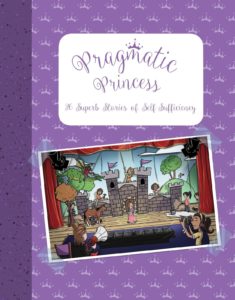FOR IMMEDIATE RELEASE
OTTAWA, Ontario – Drawing from her own experience as a mother and a research psychologist, award-winning author Dr. Rachel Kowert presents tales of empowerment and self-reliance in her new children’s book, “Pragmatic Princess: 26 Superb Stories of Self-Sufficiency.”
Inspired by her own frustration as a mother of two seeking reading content featuring female leads who weren’t superheroes or male-companion dependent, Kowert’s book offers stories of everyday girls, solving everyday problems, with their everyday abilities. And the 26 stories represent children of all backgrounds, abilities and family types – each with a distinct personality – from Winnie the Wise who says, “…we are the ones who make our dreams come true, not other people, in the end it is up to you” to Xena the Xenial who reminds us, “We have so much to learn from one another, but only if we can listen to each other.”
After Kowert successfully raised more than $26,000 in just three days through a Kickstarter campaign, the book was developed with psychology and science in mind to maximize the potential for learning, as the characters in childhood stories are some of our earliest teachers. “Pragmatic Princess” is changing the narrative, moving beyond the tropes that female characters are best suited as damsels in distress or needing superpowers to be successful. And Kowert’s work pays particular attention to communities underrepresented in children’s books. More than 16 of the stories in the book feature a black, Asian or ethnic minority character in a central role, and two feature disabled children as the story leads.
“The symbolic models in our storybooks have a strong, long-lasting influence on our development,” Kowert says. “We need stories where female voices matter (no matter their ability or background) and where the diversity of the characters reflect the diversity of the world around us. by providing models that experience everyday challenging situations, ‘Pragmatic Princess’ also helps open the discussion for parents and teachers to talk about difficult childhood topics before they happen and provides the tools and strategies to successfully navigate these challenges.”
ABOUT THE BOOK

“Pragmatic Princess:
26 Superb Stories of Self-Sufficiency”
Rachel Kowert | 2019 | Your Own Castle, LLC
Hardcover | ISBN 978-0-578-58369-3 | Price: $29.99
E-Book | Price: $12.99
Dr. Rachel Kowert is a research psychologist, author and mother of two. She has previously published several non-fiction books including “A Parent’s Guide to Video Games,” which won a Foreword INDIES Award for Science. She has been featured by The Wall Street Journal, Polygon, New York Magazine’s the Science of Us, and Texas Public Radio among others.
In an interview, Rachel Kowert can discuss:
- The need for themes of empowerment, self-reliance, self-sufficiency, kindness and generosity in children’s stories.
- The importance of featuring diversity and inclusion in children’s stories
- How she developed this idea after seeking book options for her daughter that didn’t rely on male companions of superhero status.
- Her background as a mother and research psychologist and how that inspires her work
- The book’s foundation in science and extensive research
An Interview with Rachel Kowert

What inspired you to write “Pragmatic Princess,” and why is it so important to you?
As a psychologist, I know that the characters in our childhood stories are some of our earliest teachers. As a mom, I wanted books for my daughter that celebrated the powers and abilities of the everyday girl. However, when I went to find those kinds of books, they were few and far between. I wanted my daughter to have a storybook with characters that looked like her, reflected the world around her, and showed her what she was capable of doing with the skills and abilities she has right here and right now. Since that wasn’t available, I decided to write it myself.
How did you come up with the different characters and their names?
This was one of the most fun parts! More than half the characters are named after people I know or people I admire. For instance, Valerie is named after my mother, Gina is named after one of my dear friends, and Xena is named in honor of Xena the Warrior Princess (one of the very first strong and powerful women in the media that I was exposed to as a child).
We know that your daughter partially inspired this book, as you were looking for the kind of book you would want to buy for her. Is this book only for girls? What is your target audience?
This book is absolutely not just for girls! It is just as important that boys see girls solve their own problems as it is for girls to see girls solve their own problems. We read books to our daughters with male protagonists all the time and do not think twice about it! We should do the same for our boys (my son loves the book!). My target audience is those aged 3 -10+. The length is well-suited to keep the younger readers engaged whilst the topics become increasingly relevant for the older readers.
What does your daughter think about the book? Does she have a favorite princess?
My daughter loves the book! And despite the fact that “Zoe the Zealous” was named after her and designed to look like her, “Danielle the Daring” is her clear favorite. Though, I guess it is hard to compete with a girl who rides a motorcycle!
How does your background as a research psychologist inform your work?
I drew from my background to develop stories that would be fun, entertaining, but also maximize learning. Childhood stories provide an incredible opportunity to teach children a range of skills and behaviors across various categories of human development – intellectual, social, emotional, and moral. I wanted to make sure to take advantage of this opportunity by enlisting diverse characters and storylines that reflect everyday situations. My educational background also allowed me to develop characters to model effective skills and strategies to navigate some of the more difficult situations in childhood – such as fear of missing out, feeling left out, and constructive confrontation.
We know some of your past work has more of a parental audience; how was your process different when writing for children? Did anything surprise you?
It is definitely more fun writing for children! I was surprised at how much I was really able to integrate what I know about human psychology within the stories themselves. Being able to integrate a lesson or skill that I have picked up throughout my education and research career was a fantastic experience in walking the line between creative and technical writing.
Can you explain to us the science behind this book and the research that went into it?
The science behind the writing is a mix of media studies and learning theory. There is a lot of research that has found that the stories we are told as children through the media, whether it be television, movies, or books, have a long-lasting impact on our development. Knowing this, I wanted to create stories that demonstrate self-reliance but also maximize the potential for the transfer of learning through social modeling. The diverse cast of characters makes it more likely that readers will relate to any particular character and research has found that people are more likely to emulate role models of the same sex, ethnicity, and skill level of any particular activity. The book also rhymes, which helps make the content easier to memorize for younger children, which can help transition them into the pre-reading stage of development. Rhyming has also been found to encourage the development of writing skills.

A former award-winning journalist with national exposure, Marissa now oversees the day-to-day operation of the Books Forward author branding and book marketing firm, along with our indie publishing support sister company Books Fluent.
Born and bred in Louisiana, currently living in New Orleans, she has lived and developed a strong base for our company and authors in Chicago and Nashville. Her journalism work has appeared in USA Today, National Geographic and other major publications. She is now interviewed by media on best practices for book marketing.

